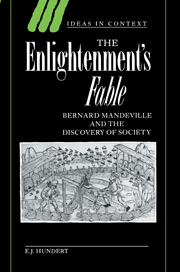Crossref Citations
This Book has been
cited by the following publications. This list is generated based on data provided by Crossref.
Backscheider, Paula R.
1995.
Introduction.
Prose Studies,
Vol. 18,
Issue. 3,
p.
1.
Evans, Geoffrey
and
Whitefield, Stephen
1995.
The Politics and Economics of Democratic Commitment: Support for Democracy in Transition Societies.
British Journal of Political Science,
Vol. 25,
Issue. 4,
p.
485.
Schochet, Gordon
1995.
Vices, benefits, and civil society: Mandeville, Habermas, and the distinction between public and private.
Prose Studies,
Vol. 18,
Issue. 3,
p.
244.
Porter, Roy
1996.
Pleasure in the Eighteenth Century.
p.
1.
Sassatelli, Roberta
1997.
Consuming Ambivalence.
Journal of Material Culture,
Vol. 2,
Issue. 3,
p.
339.
Heilbron, Johan
1998.
The Rise of the Social Sciences and the Formation of Modernity.
p.
77.
Levine, David P.
1998.
The self and its interests in classical political economy.
The European Journal of the History of Economic Thought,
Vol. 5,
Issue. 1,
p.
36.
Roberts, M.J.D.
1998.
The concept of luxury in British political economy: Adam Smith to Alfred Marshall.
History of the Human Sciences,
Vol. 11,
Issue. 1,
p.
23.
Cowan, Brian
1998.
Reasonable Ecstasies: Shaftesbury and the Languages of Libertinism.
Journal of British Studies,
Vol. 37,
Issue. 2,
p.
111.
Spellman, W. M.
1998.
European Political Thought 1600–1700.
p.
171.
Davies, Keri
1999.
Blake in the Nineties.
p.
212.
Forman‐Barzilai, Fonna
2000.
Adam Smith as globalization theorist.
Critical Review,
Vol. 14,
Issue. 4,
p.
391.
Shovlin, John
2000.
Toward a Reinterpretation of Revolutionary Antinobilism: The Political Economy of Honor in the Old Regime.
The Journal of Modern History,
Vol. 72,
Issue. 1,
p.
35.
Rist, John M.
2001.
Real Ethics.
Hawkes, David
2001.
Idols of the Marketplace.
p.
213.
Sleigh, Charlotte
2002.
Brave new worlds: Trophallaxis and the origin of society in the early twentieth century.
Journal of the History of the Behavioral Sciences,
Vol. 38,
Issue. 2,
p.
133.
Peltonen, Markku
2003.
The Duel in Early Modern England.
Maas, Harro
2003.
Where Mechanism Ends: Thomas Reid on the Moral and the Animal Oeconomy.
History of Political Economy,
Vol. 35,
Issue. Suppl_1,
p.
338.
Berg, Maxine
and
Eger, Elizabeth
2003.
Luxury in the Eighteenth Century.
p.
7.
Force, Pierre
2003.
Self-Interest before Adam Smith.





